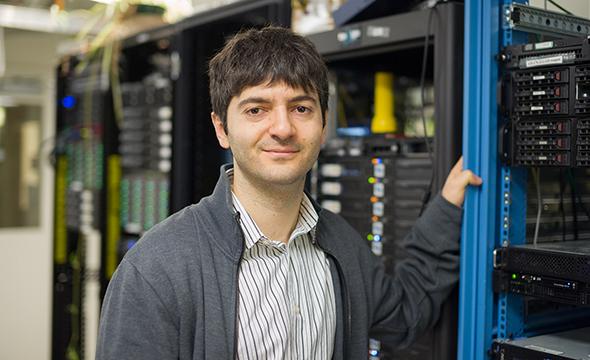
A University of Otago bioethicist has added his voice to a global plea for a moratorium on heritable genome editing from a group of international scientists and ethicists in the wake of the recent Chinese experiment aiming to produce HIV immune children.
In an article in the latest issue of international scientific journal Nature, Professor Jing-Bao Nie together with another 16 academics from seven countries, call for a global moratorium on all clinical uses of human germline editing to make genetically modified children.
They would like an international governance framework – in which nations voluntarily commit to not approve any use of clinical germline editing unless certain conditions are met – to be created potentially for a five-year period.
Professor Nie says the scientific scandal of the experiment that led to the world’s first genetically modified babies raises many intriguing ethical, social and transcultural / transglobal issues. His main personal concerns include what he describes as the “inadequacy” of the Chinese and international responses to the experiment.
“The Chinese authorities have conducted a preliminary investigation into the scientist’s genetic misadventure and issued a draft new regulation on the related biotechnologies. These are welcome moves. Yet, by putting blame completely on the rogue scientist individually, the institutional failings are overlooked,” Professor Nie explains.
“In the international discourse, partly due to the mentality of dichotomising China and the West, a tendency exists to characterise the scandal as just a Chinese problem. As a result, the global context of the experiment and Chinese science schemes have been far from sufficiently examined.”
The group of 17 scientists and bioethicists say it is imperative that extensive public discussions about the technical, scientific, medical, societal, ethical and moral issues must be considered before germline editing is permitted. A moratorium would provide time to establish broad societal consensus and an international framework.
“For germline editing to even be considered for a clinical application, its safety and efficacy must be sufficient – taking into account the unmet medical need, the risks and potential benefits and the existence of alternative approaches,” the opinion article states.
Although techniques have improved in recent years, germline editing is not yet safe or effective enough to justify any use in the clinic with the risk of failing to make the desired change or of introducing unintended mutations still unacceptably high, the scientists and ethicists say.
“No clinical application of germline editing should be considered unless its long-term biological consequences are sufficiently understood – both for individuals and for the human species.”
The proposed moratorium does not however, apply to germline editing for research uses or in human somatic (non-reproductive) cells to treat diseases.
Professor Nie considers it significant that current presidents of the UK Royal Society, the US National Academy of Medicine and the Director and Associate Director of the US National Institute of Health have expressed their strong support for such a proposed global moratorium in two correspondences published in the same issue of Nature. The editorial in the issue also argues that the right decision can be reached “only through engaging more communities in the debate”.
“The most challenging questions are whether international organisations and different countries will adopt a moratorium and if yes, whether it will be effective at all,” Professor Nie says.
Learn more: Otago bioethicist adds voice to global plea for moratorium on heritable genome editing
The Latest on: Heritable genome editing
[google_news title=”” keyword=”heritable genome editing” num_posts=”10″ blurb_length=”0″ show_thumb=”left”]
via Google News
The Latest on: Heritable genome editing
- New Epigenome Editing Platform Enables the Precise Programming of Epigenetic Modificationson May 9, 2024 at 2:00 am
A study from the Hackett group at EMBL Rome led to the development of a powerful epigenetic editing technology, which unlocks the ability to precisely program chromatin modifications. Understanding ...
- Team develops an epigenome editing toolkit to dissect the mechanisms of gene regulationon May 8, 2024 at 5:00 pm
The set of epigenetic modifications of a cell's genome is referred to as the epigenome. In a study just published in Nature Genetics, scientists from the Hackett Group at EMBL Rome have developed a ...
- ASGCT 2024: Mammoth Sizes Up Genome Editing Opportunitieson May 8, 2024 at 11:16 am
We catch up with Mammoth Biosciences CSO Lucas Harrington after his ASGCT presentation. Harrington lays out his company's big plans in developing a range of therapeutic options using miniature Cas ...
- Cutting-Edge CRISPR: Princeton Researchers Develop a More Precise Gene-Editing Toolon May 5, 2024 at 5:07 am
Princeton scientists make a major improvement to a CRISPR-based gene-editing tool called “prime editing.” Through years of engineering gene-editing systems, researchers have developed a suite of tools ...
- Measuring Mutagenesis with Precision Genome Editingon May 3, 2024 at 5:14 am
A new prime editing sensor library targeting p53 mutations allowed scientists to interrogate thousands of tumor genotypes as they arose in endogenous contexts.
- Advancing crop breeding through targeted genome modificationon April 24, 2024 at 5:00 pm
Modern crop breeding is entering a new era of genome design, led by genome editing technologies as mainstream tools for targeted genome modification. In a review published in Nature Reviews ...
- Baylor/Rice Genome Editing Testing Centeron April 4, 2024 at 9:27 am
The Baylor/Rice Genome Editing Testing Center (GETC) offers researchers in vivo evaluation of genome editing activity, biodistribution and efficacy in mouse models as a fee-for-service. Our center ...
- Somatic genome editingon March 14, 2024 at 8:37 am
Genome editing can be performed in germline cells (sperm, eggs or embryos) to induce heritable genetic changes or in somatic cells (other cells) to induce non-heritable changes. Somatic cell editing ...
- CRISPR Gene Editing Newson October 22, 2023 at 5:00 pm
Nov. 9, 2023 — Scientists used their expertise in quantum biology, artificial intelligence and bioengineering to improve how CRISPR Cas9 genome editing tools work on organisms like microbes that ...
- The Mutant Projecton September 12, 2023 at 9:31 am
Mallapaty, Smriti 2022. How to protect the first ‘CRISPR babies’ prompts ethical debate. Nature, Vol. 603, Issue. 7900, p. 213. Labude, Markus K. Xafis, Vicki Lai, Poh San and Mills, Catherine 2022.
via Bing News










